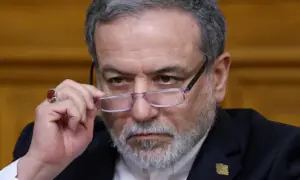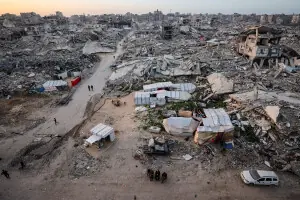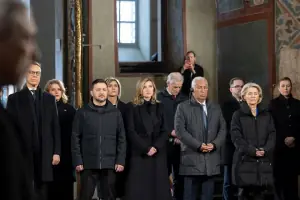Russian attack on Ukraine possible 'any day' but diplomacy still an option -White House
3 min readWASHINGTON: Russia could invade Ukraine within days or weeks but could still opt for a diplomatic path, White House national security adviser Jake Sullivan said on Sunday.
"We are in the window. Any day now, Russia could take military action against Ukraine, or it could be a couple of weeks from now, or Russia could choose to take the diplomatic path instead," Sullivan told the "Fox News Sunday" program.
Sullivan made the comments in television interviews after two U.S. officials on Saturday said Russia, which seized Crimea from Ukraine in 2014, has in place about 70% of the combat power it believes it would need for a full-scale invasion of Ukraine.
As Russia masses more than 100,000 troops near the border, Moscow has said it is not planning an invasion but could take unspecified military action if its security demands are not met.
Those include a promise that NATO will never admit Ukraine, a demand the United States and the 30-nation Western security alliance have called unacceptable.
Possible Russian action could include annexing Ukraine's Donbass region, where Russian-backed separatists broke away from Ukrainian government control in 2014, cyberattacks or a full-scale invasion of Ukraine, Sullivan added, saying Russia could act as soon as Monday though it could also be weeks.
"We believe that there is a very distinct possibility that Vladimir Putin will order an attack on Ukraine," Sullivan told ABC's "This Week" program.
"It could take a number of different forms. It could happen as soon as tomorrow, or it could take some weeks yet. He has put himself in a position with military deployments to be able to act aggressively against Ukraine at any time now," Sullivan added, referring to Russian President Vladimir Putin.
Washington has made clear it would not send U.S. soldiers to defend Ukraine, which is not a member of NATO.
However, Washington has given Kyiv arms and last week said it would send nearly 3,000 extra troops nL1N2UD16S to Poland and Romania to shield Eastern Europe from potential spillover from the crisis.
A plane carrying U.S. troops landed in Poland nL8N2UH069 on Sunday, a Reuters witness said. On Wednesday, the Pentagon said around 1,700 service members, mainly from the 82nd Airborne Division, would deploy from Fort Bragg, North Carolina, to Poland.
The United States, with its allies, has threatened extensive economic sanctions against Russia. These could include financial sanctions as well as export-control measures nL1N2U01MK].
U.S. Deputy Treasury Secretary Wally Adeyemo on Sunday said any sanctions would hit Putin and Russian elites hard given their reliance on Europe, which is Russia's largest trading partner, and the U.S. dollar.
"By the United States and Europe acting together, we put ourselves in a position where we not only would have an impact on the overall Russian economy but we'd have a direct impact on President Putin, who is tied to the Russian economy," he told CBS News' "Face the Nation" in an interview.
On a daily basis, Russian financial institutions do about $46 billion worth of financial transactions globally with 80% of those in dollars, Adeyemo said. Russia's biggest trading partner is Europe, accounting for about 40% of Russian commerce.
Asked if Russia could instead just turn to China, Adeyemo said the severity of planned U.S. sanctions and Russia's ties with the West would make that difficult.
"China can't give Russia what they don't have," he said, saying China "does not have access" to critical technologies Russia relies on from the United States and its allies nor is China where Russian elites prefer to put their money.
"Russian elites, who would be cut off from the global financial system, are not putting their money in China. They're putting their money in Europe and in the United States," he told CBS. Cutting them and their families off "would limit their ability to do business in the ways they've done it in the past."
For the latest news, follow us on Twitter @Aaj_Urdu. We are also on Facebook, Instagram and YouTube.

























Comments are closed on this story.